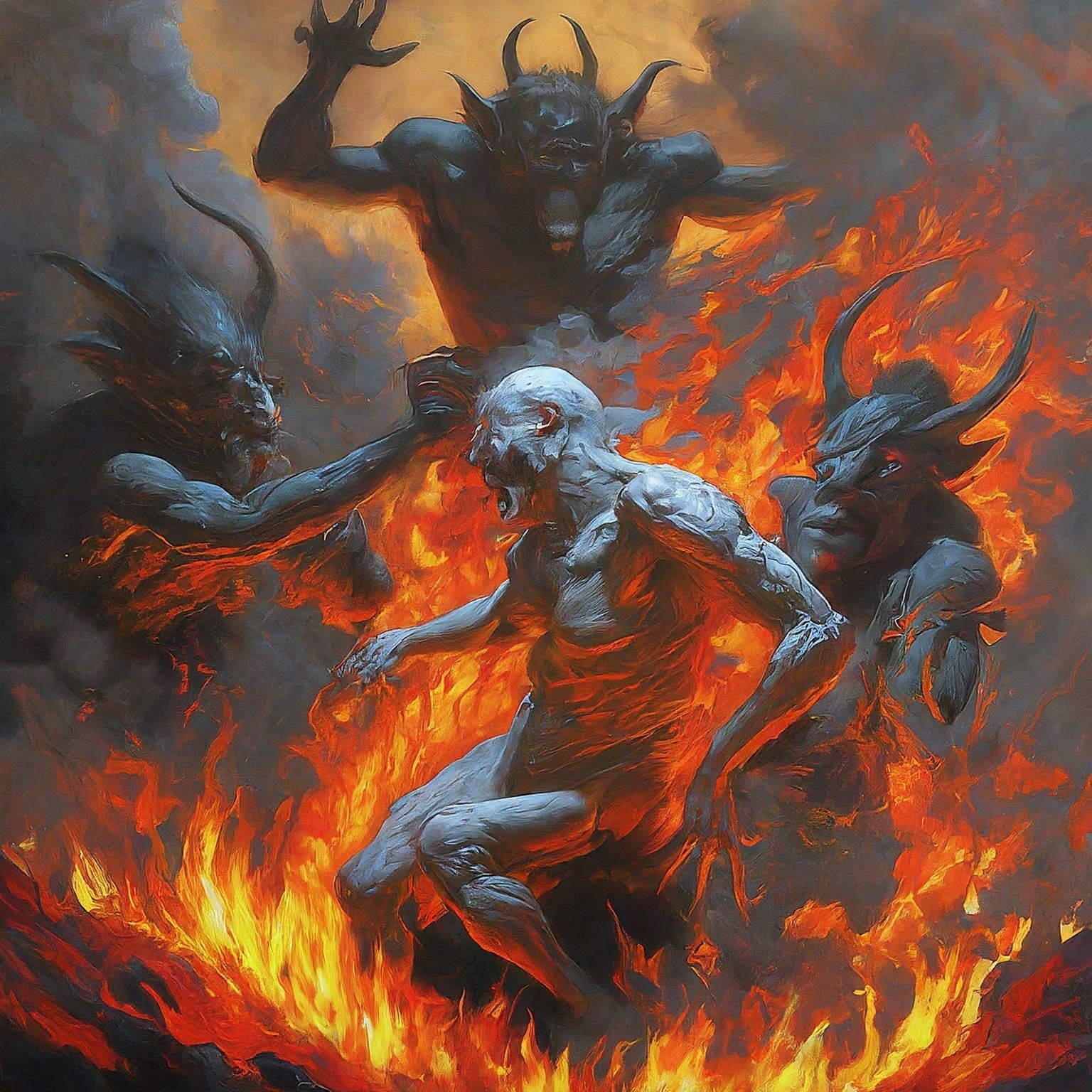The Suffering God, Man, and Hell.
The Divine Paradox: A loving God who condemns man to eternal torment?
THEOLOGICAL INSIGHTS
A. Cortés
6/29/20249 min read


INTRODUCTION
It was in the early hours of that Sunday when the echo of three gunshots resonated through the quiet park in southern Mexico. The criminal, struck by the bullets from a powerful weapon, collapsed on the ground, seized by unbearable pain. He screamed in anguish and cried out for help. His death throes seemed to mingle with laments of a suffering that went beyond physical pain. "It wasn't just the wounds," a witness recounted, "he already felt the fire of hell consuming him in that instant." That was how that night was tinged with tragedy, as the man's life faded away amidst agony, anguish, and despair.
The man, gripped by a mixture of conviction and fear, continued his account. His face reflected a deep consternation as he evoked the infernal torments that awaited those who, like the deceased, had not led a righteous life. How could one not think about it? The Manual of Catholic Catechism (F. Chreibmayr. (1964, 277-288.) describes hell as a place of horrible torment and eternal damnation for all who close themselves off from the love of God and, therefore, die in mortal sin; there is the weeping and gnashing of teeth amidst darkness, the full consummation of sin; its fire is nothing compared to earthly fire. According to Thomas Aquinas, this eternal supernatural hell is as real as heaven itself (D. G. Bloesch. 1982. 215).
HELL AS IT HAS BEEN TOLD TO US
It is a place of eternal exile; it is said that one finds oneself irremediably separated from communion with Christ and the saints. Hunger and cold pale in comparison to the torment of living with perverse souls, where there is no mutual aid or consolation, only a realm of selfishness where each person lives for themselves. Tormented by hatred and repugnance towards their own existence, the condemned experience an inner suffering that knows no end.
Despair, in this abyss without hope, becomes an unbearable torment: "they all feel completely abandoned and they are" (F. Chreibmayr, 1964, 286). As Dante said in the Divine Comedy, when one enters hell, Divine grace remains at its gates. For this reason, says the Manual of Catechism, the preaching and catechesis about hell must serve so that what is announced as a judgment of condemnation becomes, in the end, a means of salvation; the idea of eternal torment is nothing more than an invitation "to submit ourselves reverently to the Almighty" (Ibid. 282).
Fortunately, according to some contemporary theological currents, divine clemency manifests even in the infernal abyss. The justice and goodness of God, in their infinite wisdom, do not inflict uniform suffering on all the condemned: "God ensures that the sufferings are appropriate to the guilt and demerit of each one" (Ibid, 286). According to this line of thought, although it is necessary to distinguish between divine justice and love, they should not be conceived as separate aspects, as this would generate a fracture in the very essence of God.
THE JUSTICE AND MERCY OF GOD
From this perspective, hell becomes an irreconcilable contradiction with divine love, an eternal reality opposed to the benevolent nature of God. Consequently, divine wrath is not merely a reaction to the offense against His holiness, but a manifestation of His love. Although He punishes, He does so moved by a profound respect and love for the sinner, seeking their redemption.
This complex relationship between justice and mercy can be better understood with the following statement:
Defenders of the dogma of hell argue that universalists, by rejecting the notion of hell and focusing exclusively on divine love, neglect the value of obedience. They maintain that this sentimentalist approach to God's love ignores the dual nature of divine punishment in hell: punitive, insofar as it purifies, and remedial, insofar as it preserves divine order.
Thus we arrive at the heart of the matter: Does believing in hell truly do justice to the image of a just and holy God? Or, on the contrary, does rejecting it imply misinterpreting divine love as mere sentimentality, ignoring the justice of a God who demands obedience? (W. W. Wiersbe, 1996).
AIONIOS, SHEOL, AND GEHENNA
Among the biblical passages that have traditionally been invoked to support the idea of a fiery hell, Isaiah 66:24 stands out, with its vivid image of the worm that never dies and the unquenchable fire; Matthew 5:29, which suggests mutilation as preferable to infernal torment; Luke 12:5, which warns of the divine power to condemn to hell; and the shocking parable of Lazarus and the rich man in Luke 16. It is worth mentioning that literature and mythology, especially Greek, have also contributed to shaping our conception of hell.
And despite the abundance of passages that explicitly mention the word "hell," the question arises whether the Bible truly supports the idea of a God who inflicts eternal torment in an abyss of fire. This is the question that awaits us; a question that compels us to delve into the depths of biblical interpretation and confront the diverse perspectives that have arisen throughout history.
The key to this question lies in linguistic and semantic analysis, especially around the term "eternal." In the New Testament, the Greek word "aionios" (from which "eternal" derives) refers to a period of specific duration for a subject or thing. Therefore, the infernal fire would be "eternal" only in its results. In the Old Testament, "eternal fire" can allude to a fire that will be extinguished only after having completely consumed its target (as in the case of Sodom and Gomorrah, or in Jeremiah 17:27). In the eschatological texts of both the Old and New Testaments, the "final fire" (Argumedo, 1994: 104, 105.) is inextinguishable because its purpose is to annihilate sin, not to eternally torment souls.
On the other hand, the word "hell" is often translated from the Hebrew "sheol" or the Greek "hades," terms that simply mean "grave" or "tomb." A clear example is found in Psalm 16:10, where it reads: "You will not abandon my soul to Sheol." These terms do not evoke images of flames, despair, or torment, which calls into question the traditional interpretation of hell.
Another relevant term is "gehenna," derived from the Hebrew phrase "ge hinnom," which refers to the Valley of Hinnom, a place outside Jerusalem associated with idolatry and child sacrifice. This valley, cursed and turned into a garbage dump, acquired a pejorative meaning in later generations (Argumedo, 1994: 104-105). However, "gehenna" does not imply eternal torment, but rather total destruction. This linguistic and contextual perspective challenges the traditional notion of gehenna, or hell, as a place of eternal suffering, and opens the door to the biblical interpretation where hell is synonymous with total destruction.
CONCLUSION
We can conclude, then, that Scripture offers no indication that souls, upon dying, descend directly to hell, much less that there is communication between the inhabitants of heaven and hell. The Bible does not portray a monstrous God, consumed by wrath and vengeance, who imprisons sinners in eternal prisons to inflict physical and moral torment on them, however much He Himself suffers in doing so. What a cruel and distorted image of the divine character!
Instead, the Scriptures reveal to us a God who proclaims: “‘As I live,’ says the Lord God, ‘I have no pleasure in the death of the wicked, but that the wicked turn from his way and live. Turn, turn from your evil ways! For why should you die, O house of Israel?’” (Ezekiel 33:11). This passage reminds us that God's desire is redemption, not eternal condemnation.
Some suggest that the true hell is not a posthumous torment, but a palpable reality in this life, plagued by evil, pain, and suffering. An existence where everything is "burden, work, and vanity," where those who do not know God wander like the living dead, pierced by the daggers of sin, thirsty and groaning for the Eternal Water. Even the children of God experience loss, death, and pain. However, as the celebrated preacher Charles Spurgeon aptly said: "As sure as God sometimes puts his children in the furnace of fire, He will be in the fire with them" (C.H. Spurgeon. Sermon of 1863).
For those who have not yet embraced God, Satan offers the illusory promise of earthly glory, a mirage that quickly vanishes into pain and desolation. In contrast, Jesus invites us to carry our cross in this world, to accept present suffering in order to attain eternal glory. As the hymn says:
Sources
Franz Chreibmayr. (1964): Manual del Catecismo Católico. Editorial Herder. : Barcelona, España. Págs. 277-288.
Donald G Bloesch. (1982): Essentials of Evangelical Theology (Life, Ministry, and Hope). Vol. ll.: Harper & Row, Publishers. San Francisco. Pág. 215.
Warren W Wiersbe (1996) The Bible Exposition Commentary. Wheaton, Ill. : Victor Books.
José Luis Argumedo. (1994): La verdad os hará libres.: JAC DAVIS. Glendale, California. Pág. 104 – 105.
Charles Spurgeon: "El licor del Evangelio" (sermón 3236 del 20 de septiembre de 1863).
New Adv. Hymnal : #508: "Contendamos siempre por nuestra fe".
References:
Warren W. Wiersbe, writer and theologian, mentions regarding this point: “People ask, ‘How can a loving God even permit such a place as hell to exist, let alone send people there?’ But in asking that question, they reveal that they do not understand either the love of God or the wickedness of sin. God’s love is a holy love… not a shallow sentiment, and sin is rebellion against a holy and loving God. God does not ‘send people to hell.’ They send themselves there by refusing to heed His call and believe on His Son. The ‘unbelieving’ are named second on the list of the people who go to hell, even before the murderers and the liars (Rev. 21:8; also see John 3:18–21, 36). Occasionally you hear a lost person say, ‘Well, I don’t mind if I go to hell. I’ll have a lot of company!’ But there is no friendship or ‘company’ in hell! Hell is a place of torment and loneliness. It is not an eternal New Year’s Eve party at which sinners have a good time doing what they used to do on earth”. Warren W Wiersbe (1996) The Bible Exposition Commentary. Wheaton, Ill. : Victor Books.
Without a doubt, what popularized the dogma in question was Dante Alighieri's famous book The Comedy, later called The Divine Comedy, since it narrates the chronicle of a dream journey made to hell, purgatory, and paradise by the poet-author in the year 1300; a journey that ends in happiness, not tragedy, despite moving from earth to heaven, from perdition to redemption.: J. D Douglas et all (1997).: Who's Who in Christian History. Wheaton, Ill: Tyndale House.
Medieval descriptions of hell as a place of eternal suffering reflect the influence of theological and cultural interpretations throughout the centuries. Church Fathers such as Saint Augustine and Saint Thomas Aquinas contributed to the formation of the doctrine of hell with their writings, which often combined biblical elements with Greek and Roman philosophies. These interpretations not only solidified the idea of hell in Christian doctrine, but also influenced the literature and art of the time, perpetuating a terrifying image of the afterlife.
Beyond the Christian tradition, different religions and philosophies have adopted and adapted the idea of hell. In Islam, for example, "Jahannam" is a place of punishment for the wicked, similar in some aspects to the Christian "Gehenna."Eastern religions such as Buddhism and Hinduism also present concepts of post-mortem retribution, although with different approaches and nuances, such as the cycle of reincarnation and karma.
The various conceptions of hell also influence the morality and behavior of believers. The existence of a place of punishment after death, as many see it, acts as a mechanism of social and moral control, incentivizing individuals to follow the teachings of their faith and live ethical and just lives.
"Hell is not a concentration camp presided over by evil, but a sanatorium for sick souls who are ministered to by Jesus Christ... it is the creation of a loving God for everyone who rejects the help offered through Jesus Christ" Donald G. Bloesch.” Donald G Bloesch.
“Man is in hell not because God is absent but because He is present, and therefore, man is constantly reminded of his guilt and infamy, […] hell is not a concentration camp presided over by evil, but a sanatorium for sick souls who are ministered to by Jesus Christ. […] We can rest assured that those in hell are in the hands of a God who is just and merciful. […] All our sins sent us to hell, but only the rejection of God's grace keeps us in hell… Hell… is the creation of a loving God for everyone who rejects the help offered through Jesus Christ.” (D. G. Bloesch, 1982: 225-227)
""If we suffer here, we
shall reign there...
If we bear the cross,
For the love of Jesus,
The crown He will give us"
(A.H–Adventist Hymnal (Spanish)




soporte@digitpastor.com